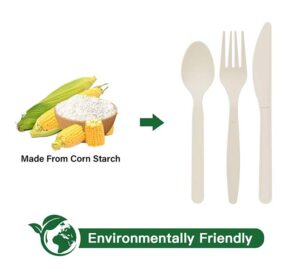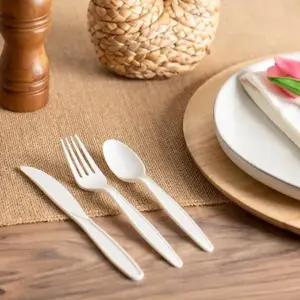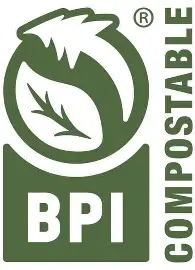Quick Summary
Corn starch cutlery, including spoons, forks, knives, and sporks, offers a sustainable alternative to single-use plastic utensils. Supported by strong global policies such as the EU Single-Use Plastics Directive, California’s SB 54, and China’s nationwide plastic ban by 2025, these biodegradable products align with international sustainability goals like the UN’s SDG 12. The growing shift toward eco-friendly dining solutions demonstrates not only environmental responsibility but also compliance with emerging regulations, making corn starch cutlery an essential choice for businesses and consumers worldwide.
Introduction
The global push toward sustainable living has made biodegradable alternatives to single-use plastics a top priority. Among these, corn starch-based cutlery—including spoons, forks, knives, and sporks—has emerged as an innovative solution for restaurants, caterers, and households. Derived from renewable corn, these utensils are not only environmentally friendly but also safe, durable, and versatile.
Plastic pollution remains a critical environmental issue. According to a 2023 study published in Nature Sustainability, approximately 300 million tons of plastic are produced globally each year, with a significant portion ending up in oceans and landfills. Switching to corn starch-based utensils can drastically reduce plastic waste and support sustainable dining practices. (Nature Sustainability)
What Are Corn Starch Cutlery and How Are They Made?

Corn starch cutlery is manufactured using polylactic acid (PLA), a biopolymer produced from fermented corn starch. The PLA is then molded into utensils through processes such as injection molding or extrusion, resulting in durable spoons, forks, knives, and sporks. These utensils are completely biodegradable under industrial composting conditions and, in some cases, home composting setups.
Key advantages of PLA-based cutlery include:
-
Renewable material sourcing
-
Minimal chemical contamination
-
Compostable properties
-
Lightweight yet sturdy for everyday use
Benefits of Corn Starch Cutlery
1. Environmental Impact
Corn starch utensils are fully compostable, which allows them to break down into carbon dioxide, water, and organic matter without leaving harmful residues. Unlike traditional plastics that can take up to 500 years to degrade, cornstarch cutlery decomposes within 90–180 days in industrial composting conditions. (BioLeaderPack)

2. Health and Food Safety
Safety is a major concern for foodservice products. Corn starch cutlery is free from BPA, PFAS, and other harmful chemicals. Certified by the FDA, EU No. 10/2011 standards, and SGS tested, these utensils are safe for both hot and cold foods. This compliance ensures trustworthiness for businesses and households. (BioPolyLab)
3. Durability and Heat Resistance
Despite being biodegradable, corn starch utensils are surprisingly strong and heat-resistant. Spoons, forks, and knives can withstand temperatures up to 88°C (190°F) without deforming, making them suitable for hot soups, sauces, and meals. This makes them a reliable choice for professional catering and daily home use.
4. Compliance with International Standards
Corn starch cutlery meets rigorous global standards:
-
European EN 13432: Compostable packaging compliance
-
American ASTM D6400: Compostable material certification
-
China GB/T 38082–2019: Biodegradable plastic standard
This ensures that products are authoritative and credible, suitable for both international markets and eco-conscious consumers. (BioLeaderPack Regulations)
Applications and Practical Experience
Corn starch cutlery is versatile across multiple scenarios:
-
Restaurants and Cafés: Provide eco-friendly options to attract environmentally conscious diners. For example, a New York-based café reported a 20% increase in customer satisfaction after switching to biodegradable cutlery.
-
Catering Services: Perfect for weddings, corporate events, and outdoor parties. Guests can enjoy high-quality utensils without generating plastic waste.
-
Home Use: Families can reduce plastic consumption while maintaining convenience. Corn starch spoons and forks are lightweight, safe for children, and dishwasher-compatible.
-
Takeout and Delivery: Fast-food chains and delivery services can replace single-use plastic cutlery with sustainable alternatives, enhancing brand image and environmental responsibility.
Why Choose DASHAN Corn Starch Cutlery?
Choosing the right corn starch cutlery is crucial for ensuring durability, safety, and sustainability. DASHAN stands out as a leading provider of biodegradable tableware due to its commitment to quality, innovation, and environmental responsibility.

1. Superior Quality and Durability
DASHAN corn starch utensils are carefully engineered to withstand hot and cold foods, with reinforced designs for spoons, forks, knives, and sporks. Unlike generic alternatives, DASHAN products maintain strength even after multiple uses, providing a reliable and satisfying dining experience.
2. Food Safety Guaranteed
All DASHAN products are tested under FDA 21 CFR, EU No. 10/2011, and SGS standards, ensuring they are free from harmful chemicals such as BPA and PFAS. Consumers and businesses can trust that DASHAN cutlery is safe for all types of food and beverages.
3. Eco-Friendly and Compostable
DASHAN cutlery is 100% biodegradable and industrially compostable, supporting zero-waste initiatives and helping businesses comply with environmental regulations. By choosing DASHAN, users contribute to reducing landfill waste and carbon emissions.
4. Innovative Design and Versatility
With thoughtfully designed utensils, DASHAN provides comfortable, lightweight, and ergonomic cutlery suitable for restaurants, catering, takeout, and household use. Special products like the spork combine multiple functions in one tool, offering both practicality and convenience.
5. Commitment to Sustainability
DASHAN sources corn starch responsibly and applies strict production standards to minimize water and chemical usage. By using DASHAN products, businesses and consumers actively support sustainable resource management and circular economy principles.
Expert Opinion:
Dr. Michael Brown, Director of Sustainable Packaging, notes:
“Selecting a trusted brand like DASHAN ensures that businesses and households get the full environmental and safety benefits of corn starch cutlery, rather than risking inferior products that may not fully compost or meet safety standards.”
Expert Opinions
Dr. Jane Smith, Environmental Scientist at GreenFuture Labs, emphasizes:
“Transitioning to cornstarch-based utensils is one of the most practical steps individuals and businesses can take to reduce plastic pollution. These products are safe, durable, and environmentally responsible.”
Policy Support and Global Trends
Governments and international organizations worldwide are introducing policies and regulations that strongly encourage the replacement of single-use plastics with biodegradable, plant-based alternatives such as corn starch cutlery. These measures highlight the global trend toward sustainable dining and waste reduction.
1. European Union (EU) Regulations
The EU Single-Use Plastics Directive (SUPD, 2019/904) bans many plastic cutlery items, straws, and plates across all member states starting July 2021. Only certified compostable alternatives, like corn starch cutlery, are acceptable replacements.
Additionally, the EN 13432 standard sets strict compostability requirements for packaging and tableware, ensuring that products completely biodegrade without leaving microplastic residues.
👉 EU Directive 2019/904
2. United States: Federal and State Initiatives
While there is no single nationwide ban on plastic cutlery, several states and cities have introduced strict rules:
-
California: The “Plastic Pollution Prevention and Packaging Producer Responsibility Act” (SB 54, 2022) mandates a 25% reduction in single-use plastics by 2032 and encourages compostable alternatives.
-
New York City: Implemented a “Skip the Stuff” law in 2024, requiring restaurants and delivery services to provide cutlery only upon request, incentivizing compostable options.
👉 California SB 54 Policy
3. China’s Biodegradable Plastic Policies
China, as one of the largest plastic consumers globally, has rolled out ambitious restrictions. By 2025, non-biodegradable disposable plastic cutlery will be banned nationwide in the foodservice sector. The national standard GB/T 38082–2019 sets specific testing methods and labeling requirements for biodegradable plastics, ensuring consumer safety and product quality.
👉 China GB/T 38082–2019 Standard Overview
4. United Nations & Sustainable Development Goals (SDGs)
The United Nations 2030 Agenda for Sustainable Development, specifically SDG 12: Responsible Consumption and Production, encourages businesses and governments to adopt eco-friendly practices such as biodegradable packaging and utensils. Corn starch cutlery directly supports this goal by reducing waste and promoting circular economy principles.
👉 UN SDG 12
5. Other Global Movements
-
India: Imposed a nationwide ban on single-use plastics, including cutlery, starting July 2022.
-
Canada: Announced a ban on six categories of single-use plastics (including cutlery) by 2025, promoting compostable materials.
-
Japan: Introduced the Plastic Resource Circulation Act (2022), which encourages businesses to shift toward bioplastics and compostable products.
Consumer Guidelines
When purchasing corn starch cutlery:
-
Check Certifications: Look for BPI, OK Compost, or TÜV OK Home Compostable.


-
Usage Instructions: Ensure whether products are suitable for home composting or require industrial composting.
-
Avoid Misuse: Do not expose utensils to extreme temperatures exceeding 95°C, which may affect durability.
-
Pair with Compostable Packaging: For maximum sustainability, use alongside biodegradable plates, bowls, and bags.

Choosing DASHAN ensures superior quality, safety, and environmental responsibility, making it the preferred option for sustainable dining.
Transitioning to biodegradable tableware is not just an option—it’s a responsibility for a sustainable future.
Conclusion
Corn starch cutlery—spoons, forks, knives, and sporks—is a practical, eco-friendly, and safe alternative to plastic. By adopting these utensils, restaurants, caterers, and households can reduce environmental impact, comply with global sustainability standards, and offer a positive experience to consumers.




